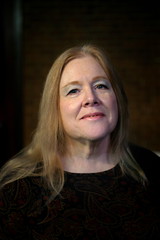Borrowing wisdom unheeded......
Still drooping around the edges, trying to cope and set up a writing schedule....
on today's Huffington Post Blog:
William James's bitter "Address on the Philippine Question" in 1903 could have been filed on an inspection of Baghdad in 2006:
"... all the anti-imperialistic prophecies were right. One by one we have seen them punctually fulfilled: -- The material ruin of the [nation]; the transformation of native friendliness to execration; the demoralization of our army... torture whitewashed, massacre condoned; the creation of a chronic anarchy... ; the deliberate reinflaming on our part of ancient tribal animosities...; these things, I say, or things like them, were things which everyone foretold; while the incapacity of our public for taking the slightest interest in anything so far away was from the outset a foregone conclusion."
Still more uncannily modern, or post-modern, and timely, is James's reflection in the same speech on what we call "American exceptionalism:"
"We used to believe... that we were of a different clay from other nations, that there was something deep in the American heart that answered to our happy birth, free from that hereditary burden which the nations of Europe bear, and which obliges them to grow by preying on their neighbors. Idle dream! pure Fourth of July fancy, scattered in five minutes by the first temptation. In every national soul there lie potentialities of the most barefaced piracy, and our own American soul is no exception to the rule. Angelic impulses and predatory lusts divide our heart exactly as they divide the hearts of other countries. It is good to rid ourselves of cant and humbug, and to know the truth about ourselves. Political virtue does not follow geographical divisions. It follows the eternal division inside of each country between the tory and the liberal tendencies, the jingoism and animal instinct that would run things by main force and brute possession, and the critical conscience that believes in educational methods and in rational rules of right."
-William James, "Address on the Philippine Question" in William James: Writings 1902 - 1910, Library of America.--Christopher Lydon
on today's Huffington Post Blog:
William James's bitter "Address on the Philippine Question" in 1903 could have been filed on an inspection of Baghdad in 2006:
"... all the anti-imperialistic prophecies were right. One by one we have seen them punctually fulfilled: -- The material ruin of the [nation]; the transformation of native friendliness to execration; the demoralization of our army... torture whitewashed, massacre condoned; the creation of a chronic anarchy... ; the deliberate reinflaming on our part of ancient tribal animosities...; these things, I say, or things like them, were things which everyone foretold; while the incapacity of our public for taking the slightest interest in anything so far away was from the outset a foregone conclusion."
Still more uncannily modern, or post-modern, and timely, is James's reflection in the same speech on what we call "American exceptionalism:"
"We used to believe... that we were of a different clay from other nations, that there was something deep in the American heart that answered to our happy birth, free from that hereditary burden which the nations of Europe bear, and which obliges them to grow by preying on their neighbors. Idle dream! pure Fourth of July fancy, scattered in five minutes by the first temptation. In every national soul there lie potentialities of the most barefaced piracy, and our own American soul is no exception to the rule. Angelic impulses and predatory lusts divide our heart exactly as they divide the hearts of other countries. It is good to rid ourselves of cant and humbug, and to know the truth about ourselves. Political virtue does not follow geographical divisions. It follows the eternal division inside of each country between the tory and the liberal tendencies, the jingoism and animal instinct that would run things by main force and brute possession, and the critical conscience that believes in educational methods and in rational rules of right."
-William James, "Address on the Philippine Question" in William James: Writings 1902 - 1910, Library of America.--Christopher Lydon


0 Comments:
Post a Comment
<< Home